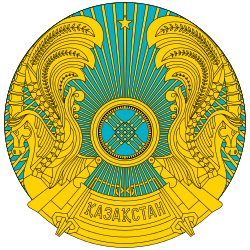Christianity in Kazakhstan
Christianity in Kazakhstan is the second most practiced religion after Islam. Over one-quarter of the population of Kazakhstan identifies as Christian. The majority of Christian citizens are Russians, including Ukrainians and Belarusians, who belong to the Orthodox Church in Kazakhstan under the Moscow Patriarchate. About 1.5 percent of the population is ethnically German, most of whom follow Roman Catholicism or Lutheranism. There are also many Presbyterians, Jehovah's Witnesses, Seventh-day Adventists and Pentecostals.[1][2] Methodists, Mennonites, and Mormons have also registered churches with the government.[1]
There are more Protestant congregations - 93 "nontraditional" Protestant Christian churches registered with the Kazakh government from 2006 to 2007. There are 83 Roman Catholic churches in Kazakhstan.[1] According to a 2009 national census, 26% of Kazakhstan's population is Christian.[3] There are two Baptist organizations in Kazakhstan: the Council of Churches of Evangelical Christians and Baptists, with 1,000 members, and the Baptist Union of Kazakhstan, with 10,000 members. 198 churches affiliated with the Baptist Union are registered with the government.[1]
Demographics

According to the 2009 Census, there were 4,214,232 Christians in Kazakhstan. Their ethnic affiliation is as follows:[4]
- Russians - 3,476,748 (91.6% of the ethnic Russians)
- Ukrainians - 302,199 (90.7% of Ukrainians)
- Germans - 145,556 (81.6%)
- Belarusians - 59,936 (90.2%)
- Koreans - 49,543 (49.4%)
- Kazakhs - 39,172 (0.4%)
- Polish - 30,675 (90.1%)
- Tatars - 20,913 (10.2%)
- Azeris - 2,139 (2.5%)
- Uzbeks - 1,794 (0.4%)
- Uighurs - 1,142 (0.5%)
- Chechens - 940 (3.0%)
- Tajiks - 331 (0.9%)
- Turkish - 290 (0.3%)
- Kyrgyz - 206 (0.9%)
- Kurds - 203 (0.5%)
- Dungan - 191 (0.4%)
- Other minorities - 82,254 (52.3%)
History

Before conquest of Genghis Khan there used to be some Nestorians.
By the time they were conquered by Genghis Khan most of the Naimans were Christians. They remained so after the Mongol conquest and were among the second wave of Christians to enter China with Kublai Khan.[5] Meanwhile, the Naimans who settled in Western Khanates of Mongol "Empire" all eventually converted to Islam.
Persecutions
On 25 July 2013, a report said that 67-year-old Bakhtzhan Kashkumbaev, a jailed pastor arrested in May and accused of using mind-altering drinks (which turned out to be red tea purchased from local suppliers) to pry donations from a member of his congregation, had gone on a hunger strike amid reports that authorities were planning to transfer him to a psychiatric facility to undergo a compulsory mental-health examination. The pastor says the examination is aimed at locking him up in a psychiatric hospital and the criminal case against him "is going nowhere" and thus came up with the idea of sending him for psychiatric evaluation. Kashkumbaev, an ethnic Kazakh and Christian convert, has been a pastor at his Blagodat Baptist church in Astana since 1995 and was accused of exerting "psychological influence" on church member Lyazzat Almenova through the use of mind-altering drinks, sermons, and prayers in order to compel her to donate money to the church. Both Kashkumbaev and the 34-year-old Almenova deny the charges with Almenova insisted that she was "perfectly healthy" and that the pastor had "done nothing" to damage her health.[6]
On 9 October 2015, a court in Astana began hearing the case against 54-year-old Yqylas Qabduaqasov charged with inciting religious hatred. Qabduaqasov is a Protestant convert and an active member of the Seventh-day Adventist Church.[7] Saryarqa District Court Judge Aqmaral Isaeva allowed journalists to film only three minutes of the trial's start and then banned any recording devices in the courtroom. Several witnesses in the case testified that Qabduaqasov expressed ideas during Bible study sessions that sounded insulting to Muslims and the Prophet Muhammad. Qabduaqasov, who was arrested in mid-August, pleaded not guilty.[8]
In spite of persecution of converts from Islam to Christianity, a 2015 study estimates some 50,000 believers in Christ from a Muslim background residing in the country.[9]
See also
- Bukharan Jews
- Judaism in Kazakhstan
- Hinduism in Kazakhstan
- Islam in Kazakhstan
- Catholicism in Kazakhstan
References
- 1 2 3 4 International Religious Freedom Report 2008 U.S. Embassy in Astana, Kazakhstan
- ↑ Kazakhstan CIA The World Factbook
- ↑ "Итоги национальной переписи населения 2009 года (Summary of the 2009 national census)" (in Russian). Agency of Statistics of the Republic of Kazakhstan. Retrieved 15 November 2010.
- ↑ http://www.stat.kz/p_perepis/Documents/%D0%9D%D0%B0%D1%86%20%D1%81%D0%BE%D1%81%D1%82%D0%B0%D0%B2.rar
- ↑ Cary-Elwes, Columba. China and the Cross. (New York: P. J. Kennedy and Sons, 1956) p. 37
- ↑ Jailed Pastor Goes On Hunger Strike In Kazakhstan. 25 July 2013. Radio Free Europe. Retrieved 15 October 2015.
- ↑ Christian Convert Faces 10 Years Imprisonment In Kazakhstan. Religious Freedom Coalition. Retrieved 14 October 2015.
- ↑ Kazakh Protestant Convert Facing Incitement Charges. Radio Free Europe. Retrieved 14 October 2015.
- ↑ Johnstone, Patrick; Miller, Duane Alexander (2015). "Believers in Christ from a Muslim Background: A Global Census". IJRR 11 (10): 1–19. Retrieved 30 October 2015.
External links
| ||||||||||||||
| ||||||||||||||||||
| |||||||||||||||||||||||||||||||||||||||||||||||||||||||||||||||||||||

